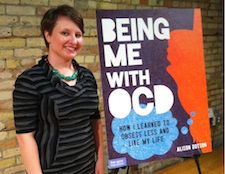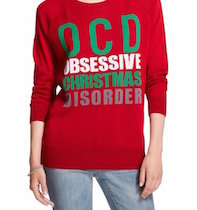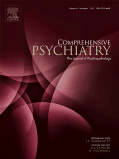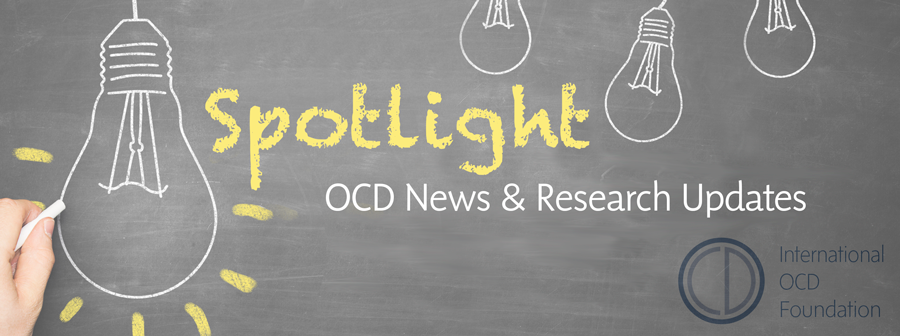The second edition of Spotlight: OCD News & Research Updates is here! To recap, this new blog series is meant to serve as a monthly resource to bring you the latest in research news and information on OCD and related disorders. This month’s edition also features a special research highlight on pediatric OCD.
This series is also available via email so you can receive the latest research news and information directly in your inbox. Sign up to receive our January update, as well as all future issues, by going here and selecting the “Spotlight” option on our email signup form.
Making Headlines
OCD advocates and stories making news around the globe this month.
 You Are Not Your Thoughts: Learning to Live with Obsessive-Compulsive Disorder
You Are Not Your Thoughts: Learning to Live with Obsessive-Compulsive Disorder
Health Stories Project, November 2015
“If you have OCD, one of the most important things is to know you’re not alone. Even if you have taboo thoughts, there is definitely someone out there who has had the same kind of obsession.” This post and short video that accompanies it features Alison Dotson, president of OCD Twin Cities, an IOCDF affiliate, and frequent guest blogger for the IOCDF!
Target accused of poking fun at OCD with ‘Obsessive Christmas Disorder’ sweater
NBC TODAY, November 2015
This is just one of many articles that appeared after Target unveiled a new line of holiday sweaters that define OCD as “Obsessive Christmas Disorder.” People have taken to Twitter to let Target know that this kind of thinking — and marketing — is not OK, as it trivializes mental illness.
 Tell Target: Should OCD really be a source of holiday cheer?
Tell Target: Should OCD really be a source of holiday cheer?
IOCDF Blog, November 2015
For another perspective on the #TargetSweater controversy, read a recent blog written by Dr. Jeff Szymanski, executive director of the IOCDF, that focuses on how the sweater can actually be used as a chance to educate and set the record straight when it comes to language used to discuss mental health, especially the term “OCD.” This OCD sweater is more than just a silly joke, and by continuing to sell the product, Target’s sweater actually contributes to furthering the stigma and obstacles OCD sufferers too often face in accessing treatment.
 John Green on Mental Illness
John Green on Mental Illness
Vlogbrothers YouTube Channel, November 2015
John Green, author of The Fault in Our Stars and Paper Towns, opens up about his personal experience with OCD in a great new video about some of the larger lessons he’s learned while dealing with a chronic illness like OCD. Watch (starting around :56) for some great takeaways from John and, in his words, “Don’t forget to be awesome!”
IOCDF SCB Showcase
Members of the IOCDF Scientific and Clinical Advisory Board (SCB) are among the best clinicians and investigators in the United States who treat and/or conduct research in the field of OCD and related disorders. Here, we recognize SCB members whose work has recently turned heads in the scientific community or general public.
 Defining clinical severity in adults with obsessive-compulsive disorder ($)
Defining clinical severity in adults with obsessive-compulsive disorder ($)
Comprehensive Psychiatry, November 2015
Eric Storch and Adam Lewin are among the authors of this study that examined the Yale–Brown Obsessive–Compulsive Scale (Y-BOCS), the most commonly used instrument to assess the clinical severity of obsessive–compulsive symptoms. Data from the study provided empirically-based benchmarks on the Y-BOCS for defining the clinical severity of treatment seeking adults with OCD, which can be used for normative comparisons in the clinic and for future research.
OCD Research Corner
A monthly roundup of the latest in OCD research from scientific journals.
Inside the World of OCD
 Pitt Med, Fall 2015
Pitt Med, Fall 2015
Susanne Ahmari, an MD/PhD and assistant professor of psychiatry in the University of Pittsburgh’s School of Medicine and member of the IOCDF Research Grant Review Committee, is leading a team of researchers in using clinical observations and new neuroscience tools to extricate a deeper understanding of OCD. The team is striving to help patients who have, at different periods in their lives, become consumed by OCD.
 Internet-delivered cognitive behavioural therapy in the treatment of psychiatric illness ($) (first page preview free)
Internet-delivered cognitive behavioural therapy in the treatment of psychiatric illness ($) (first page preview free)
Canadian Medical Association Journal, November 2015
The review looks at recent, high quality studies and the growing body of literature on smartphone and tablet applications for mental illness and concluded that Internet-delivered cognitive behavioral therapy (CBT) allows easier and quicker access to CBT with lower cost and greater convenience than traditional therapy. Strong evidence from randomized controlled trials indicates that Internet-delivered CBT can be used in clinical practice for many patients.
IOCDF Research Resources
Find other research-related resources from the IOCDF, including:
- Join a research study as a participant
- Learn about the IOCDF Research Grant Program
- Donate to the IOCDF Research Grant Fund
For researchers:


Leave a Reply